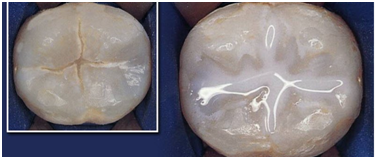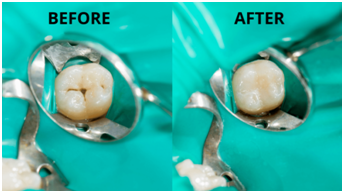Dental operations have generally been associated with suffering for many patients. Another of the primary reasons that many patients who want medical treatment for dental issues do not obtain it is because they are in pain. Individuals are apprehensive about receiving future dental care as a result of the terrible experiences they experienced throughout earlier dental surgeries.
Dental practitioners now believe that they would give pain-free dentistry services to customers thanks to advancements in dental technology. Patients experiencing dental anxiety benefit from pain-free dentistry because it helps to alleviate the source of their concern and reduces or eliminates the pain connected with dental treatments.

Are Pain-Free Dentists a Fact or Even a Myth?
Individuals may believe that dental operations are impossible to be pain-free due to the structure of the treatments. Doctors may now deliver a pain-free or less unpleasant encounter with their patient’s thanks to recent advancements in dentistry. So these are some methods your dentist could use to alleviate the pain associated with dental procedures.
Lasers:
Optical treatments have become an important feature of modern dentistry. Ligamentous operations, such as gum surgery, are frequently treated using lasers. Patients always get apprehensive and anxious when they see the knife used during dental procedures. However, laser surgery has resulted in less blood, less discomfort, therefore fewer grounds for fear.
Laughing Gas:
During dentistry, nitrous oxide, also known simply as laughing gas, is often used to relieve pain as well as anxiety. It is indeed a tool to help clients relax and feel at ease while getting dental work done. Inhaling laughing gas is indeed a safe and effective way for both youngsters and grownups.
Comparing metals restorations with composite and porcelain restorations, composites with porcelain fillings have become less uncomfortable. Dentists must normally drill deeply into the teeth to build a firm foundation with metal fillings, however, this weakens the teeth and leaves them more susceptible to fracture.
Dentists might not have to dig as many teeth with composite as well as porcelain treatments since they can be fastened to the teeth with adhesives.

The Advantages of Painless Dental Treatment
Painless dental procedures alleviate patients’ dental phobias, allowing them to have more confidence in their dentist. Individuals gain significantly from this since a healthy dentist-patient relationship ensures that individual dental requirements are constantly met in manners that are convenient for them.
People will be increasingly ready to accept treatments if the procedures are painless. Individuals will be much more amenable to having an implant installed or having a crown installed on their teeth if there is no pain or suffering. This would also improve the dental health of those who are impacted.
How Dentists Sealants Could Prevent Dental Problems as well as Pain
These back teeth have such a diversity of recesses, fractures, and holes that aid in chewing as well as grinding down food. Unfortunately, getting every one of the material plus plaque out of those crevices can indeed be challenging. Dental sealants could assist to protect individual teeth against tooth decay as well as pain.

How Do Dental Sealants Operate?
Sealants are a thin coating of plastic that would be applied to the teeth. These serve as a barrier amongst both the teeth as well as bacteria and foods. Toothbrush and cleaning can eliminate a lot of food plus plaque from your teeth, especially if you have flat teeth. Nevertheless, due to the numerous recesses throughout the rear of the mouth that the molars, as well as premolars, have, it’s difficult to completely cleanse them with just excellent dental care. Topical sealants serve to protect their teeth from decay-causing bacteria.
How Often Should You Seal Your Teeth?
Pit, as well as fissure deterioration, can start at any age. Sealants are also an excellent preventative dentistry treatment for both children and adolescents.
Between the years between six and fourteen, most children have sealants applied to their teeth. Sometimes children’s infant teeth develop recesses as they grow in. Sometimes in circumstances, having sealants applied to a younger child might have been a smart choice. Adults should also obtain sealants, according to several cosmetic dentists, throughout order to safeguard their teeth against diseases.
What’s the Procedure for Obtaining Sealants?
Another cosmetic dentist or dental hygienist applies the sealants towards the tooth in a series of phases.
- Their teeth will indeed be thoroughly polished beforehand.
- These teeth are therefore dried; cotton might well be inserted in the mouth even throughout treatment to keep their teeth dry.
- To roughen up the landscape and enable the sealant to bind effectively, another preparation comprising acid is rubbed onto the tooth.
- And eliminate this extra acid, the teeth are cleaned and dried.
- Then the sealant is applied to the teeth, hardening and forming a bond.

When it comes to sealants, exactly how long do they last?
Sealants might last numerous generations assuming good maintenance and normal biting before needing to be reapplied.
Primary preventive dentistry could help you avoid dental problems and infections, as well as the pain which comes with them. Make an orthodontist today to have dental sealants applied to you and your child’s molars.
Doctors Consider Dental Sealants When?
That optimal time to seal permanent teeth is when they first emerge, before decay sets in.
The very first permanent canines appear at the age of six, while the second set appears between the ages of eleven and thirteen.
If the dentist finds that the children’s premolars, which appear between the ages of 12 and 13, have significant grooves, he or she may recommend that they be sealed.
These wisdom teeth are the final to develop. Occasionally the jaws don’t have enough room to accommodate these, causing complications.
Almost all of the time, your dentist would advise you to get them removed. Sealants might well be advised to prevent cavities if the dentist believes the wisdom tooth will take an important role in the patient’s enamel.
Thus earlier in childhood, it is critical to take appropriate and effective steps to avoid cavities. Cavities among babies are more likely to occur in adults, resulting in a lifetime of oral health concerns.
Conclusion
Dentistry is not as scary as it used to be. However, we need to be more vigilant in regards to our dental health. Get regular checkups done and maintain your oral hygiene with regular brushing, flossing and mouthwash.
